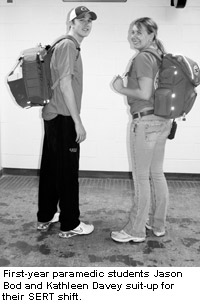Students respond to campus emergencies
Fanshawe's Student Emergency Response Teams (SERT) have been on campus since early February, and are only the second such team established at a college in Ontario according to Robert Earle, the campus security and SERT program supervisor.
 “The teams are student volunteers who have gone through what is called Modified First Response Training,” explained Earle. “They've all done a minimum of 16-hours of training specific to their responsibilities in addition to a basic first aid and CPR course they had to take prior to that.”
“The teams are student volunteers who have gone through what is called Modified First Response Training,” explained Earle. “They've all done a minimum of 16-hours of training specific to their responsibilities in addition to a basic first aid and CPR course they had to take prior to that.”
All in all that means that the 48 participating students have undergone between 24 and 30 hours of first aid training in addition to the fact that a large chunk of the volunteers are already in related fields at Fanshawe.
The teams themselves are on campus between 8 a.m. and 11 p.m. (peak student hours) and work in pairs for four-hour shifts, which alternately include time in the SERT office, near security, and time patrolling the school.
“I think it's going to make student feel a little bit better,” said Jason Bod, a first-year paramedic student who joined the team earlier this year. “Just knowing that if something does happen to them that we have been trained to be that first tier of response, to help them out before the medical professionals arrive.
“It gives them a level of safety, feeling that maybe they didn't have before knowing that we're there any time of the day and trained to help.”
Fanshawe recognized that with the growing student population it was becoming much more important to do everything in their power to ensure the students safety on campus through more than additional security.
As the first-tier of response on campus, the teams are trained to deal with anything from a hangnail to a heart attack and are equipped with a variety of medical supplies including a defibrillator and medical oxygen.
“The purpose of the program is to bridge the gap between the time an incident occurs and the time the paramedics arrive on the scene,” explained Earle. “So if we've got a very quick response and there's a better chance of survival in critical cases. And in minor situations, we can deal with those without using other college resources with those sorts of issues.”
The volunteers themselves Earle describes as being highly motivated students who are not only hoping to get real-world experience in their chosen career paths, but an ingrained want to help others in life-threatening situations.
“We had to do volunteer work,” said Kathleen Davey, a first-year police foundations student who also joined SERT. “So I decided that I wanted to do something where I'm helping people because I like to deal with people. You get to deal with situations that not everyone could handle.
“We were taught that if you have a heart attack you have eight minutes before you can actually pass away, but London is a big city and the paramedics might not get here in time. But knowing that we can get there in two-minutes and start right away, that we can give them a chance to live, that makes people feel a little more comfortable.”













